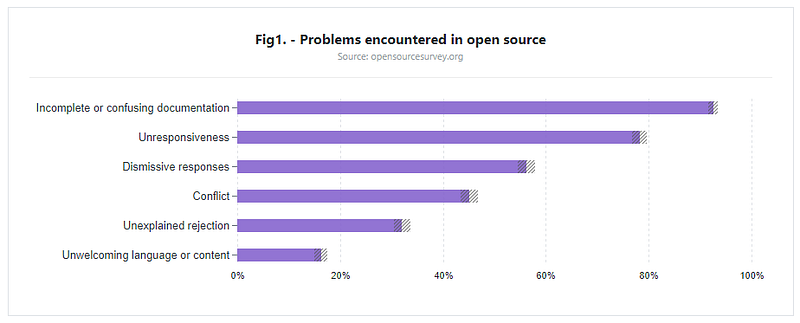Especially in Data Science Project Management
Whenever we talk about data science, chances are we’ll first think of those fancy stuff like AI, deep learning, machine learning etc.
But nobody talks about documentation for one of the reasons that we all know — it doesn’t sound sexy (or it sounds so boring).
And I completely agree that documentation is often not one of the most interesting things for data scientists. But still, it’s importance is no less than other data science workflow, especially in terms of data science project management.
In fact, documentation is no longer just the task done by programmers or developers. It’s something that we as a data scientist should know and be able to perform this task only a regular basis.
Interestingly, a 2017 Github Open Source Survey showed that “Incomplete or Confusing Documentation” was the top complaint about open source software.

2017 Github Open Source Survey
Documentation is highly valued, but often overlooked.
And this is not just only for open source documentation. Similar importance holds true to our actual workplace whereby we have to document data science workflow and be sure to keep it updated from time to time.
In the following writing, you’ll see why documentation is important in data science.
Let’s get started!
So why documentation is important in data science?
1. Reproducibility
Yes, reproducibility.
I especially agree with the article written by Matt.0 about The “Gold Standard” for Data Science Project Management. He has a Github repo for a Gold Standard workflow for setting up a new data science project directory. Go check that out!
In his article, he mentioned about this:
This excellent post on a Gold Standard for software documentation by Daniele Procida sums it up nicely when he says:
“It doesn’t matter how good your software is, because if the documentation is not good enough, people will not use it.
Even if for some reason they have to use it because they have no choice, without good documentation, they won’t use it effectively or the way you’d like them to.”
Without a good and organized documentation, people will not use the code that you’ve worked day and night for, let alone reproduce your results.
Because let’s face it.
Even if you did a great job in writing a code base for a project and you feel so proud of it. And one fine day one of your colleagues in your team intends to make improvements on top of your existing codes.
So your colleague wants to reproduce your results but he/she has no ideas on how to do due to the poor documentation. Heck, your colleague might not even understand your codes.
Reading someone else’s codes is always a torture without good documentation and comments.
The key point here is this: Make documentation as clear and simple as possible. Document your workflow consistently when you’re doing your projects (not after your projects). Document for the sake of helping others to understand your workflow and code in order for them to reproduce your results in future — either to fix some bugs or make improvements. If possible, find someone to take a look at your documentation to make sure that others are able to follow your explanation.
2. Ensure Successful Project Completion
This is important.
It doesn’t matter if you are an intern or in a full time position.
Because guess what?
No employees will be in a company forever. If they are no longer in the company and they pass down their hall finished projects without any documentation behind to others, there are only two outcome — the projects will be left hanging in the air or the projects will require much more time than expected to complete.
I learned this important lesson when I was a data scientist intern in my first internship.
At first I simply couldn’t understand the reasons behind when I was asked to make documentation from how I collected, cleaned and analyzed data to what machine learning models that I used and compared as well as the results obtained during my whole internship period.
Only after I’ve gained more experience in this field did I realize how important documentation is for data science projects, and I couldn’t be more grateful of what I’ve learned in my first internship. And I mean the detailed documentation with all your mistakes made, methods attempted, insights obtained and future suggestion actions etc.
We can’t assume others would understand what our projects are all about without showing them what our projects are and how they can build on top of your legacy when you’re no longer there.
This will make sure your projects will still continue to operate and be in good hands.



